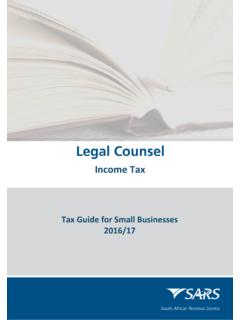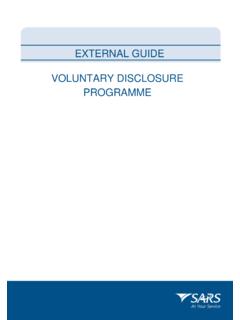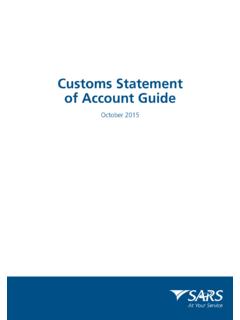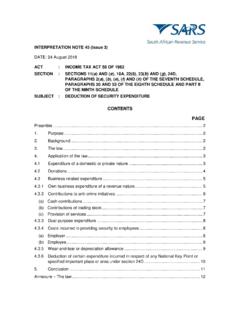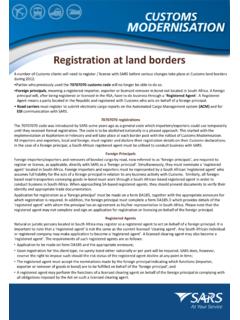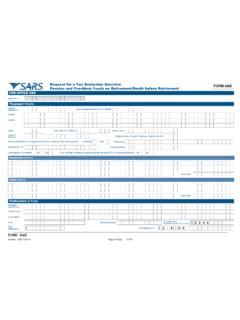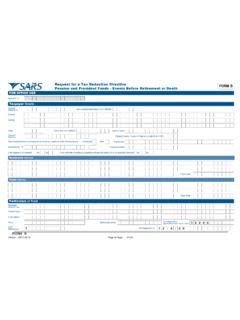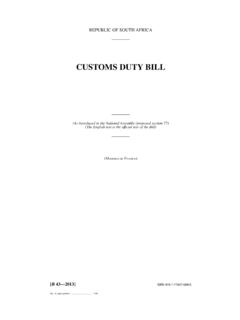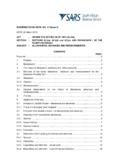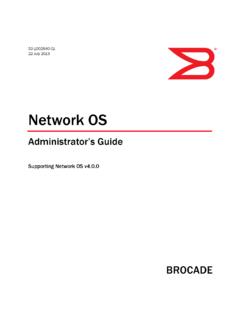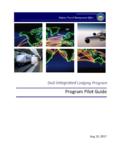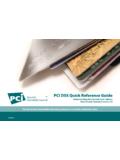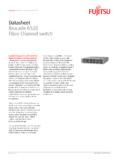Transcription of Value-Added Tax VAT 419 - SARS
1 1 2009/02/25 SP C VAT 419 guide for Municipalities Value-Added Tax VAT 419 guide for Municipalities Preface i Preface This guide is a general guide concerning the application of the Value-Added tax Act (VAT in respect of municipalities in South Africa. Although fairly comprehensive, the guide does not deal with all the legal detail associated with VAT and is not intended for legal reference. Technical and legal terminology has also been avoided wherever possible. For details in respect of the general operation of VAT, see the VAT 404 guide for Vendors which is available on the South African Revenue Service (SARS) website. All references to the VAT Act are to the Value-Added Tax Act 89 of 1991, and references to sections are to sections in the VAT Act, unless the context otherwise indicates.)
2 All references to the TA Act are to the Tax Administration Act 28 of 2011. The terms Republic , South Africa or the abbreviation RSA , are used interchangeably in this document as a reference to the sovereign territory of the Republic of South Africa, as set out in the definition of Republic in section 1(1). The terms Commissioner and Minister refer to the Commissioner for SARS and the Minister of Finance respectively, unless otherwise indicated. A number of specific terms used throughout the guide are defined in the VAT Act. These terms and others are listed in the Glossary in a simplified form to make the guide more user-friendly. The information in this guide is based on the VAT legislation (as amended) at the time of publishing, up to and including the Taxation Laws Amendment Act 15 of 2016 (as per GG 40562 dated 19 January 2017); and Tax Administration Laws Amendment Act 16 of 2016 (as per GG 40563 dated 19 January 2017).
3 This guide is not an official publication as defined in section 1 of the Tax Administration Act and accordingly does not create a practice generally prevailing under section 5 of that Act. It is also not a binding general ruling under section 89 of Chapter 7 of the Tax Administration Act nor a ruling under section 41B of the VAT Act, unless otherwise indicated. Operational information contained in this guide is up to date as at the date of publishing. However, always refer to the SARS website and any external guides specifically issued on such operational matters, which may be updated from time-to-time. All guides, interpretation notes, forms, returns and tables referred to in this guide are available on the SARS website and are as at the date of this publication. The following guides have also been issued and may be referred to for more information relating to the specific VAT topics: Vendors and Employers: Trade Classification guide (VAT / EMP 403); guide for Vendors (VAT 404) Fixed Property and Construction (VAT 409); guide for Entertainment, Accommodation and Catering (VAT 411); guide for Share Block Schemes (VAT 412); guide for Estates (VAT 413); guide for Associations not for Gain and Welfare Organisations (VAT 414); VAT 419 guide for Municipalities Preface ii guide for Motor Dealers (VAT 420); guide for Short-Term Insurance (VAT 421); and Quick Reference guide on the VAT Ruling Application Procedure.
4 Should there be any aspects relating to VAT which are not clear or not dealt with in this guide , or should you require further information or a specific ruling on a tax related legal issue, you may visit the SARS website at ; contact your local SARS branch; contact the SARS National Call Centre if calling locally, on 0800 00 7277; if calling from abroad, on +27 11 602 2093 (only between 8am and 4pm South African time); submit a ruling application to SARS headed Application for a VAT Class Ruling or Application for a VAT Ruling" together with the VAT301 form by email to or by facsimile on +27 86 540 9390; or submit legal interpretative queries on the Tax Administration Act by e-mail to or contact your own tax advisors. Comments regarding this guide may be emailed to Prepared by: Legal Counsel South African Revenue Service 30 March 2017 VAT 419 guide for Municipalities Contents ii Contents Preface.
5 I Chapter 1 Introduction .. 1 Scope of topics covered .. 1 Approach of this guide .. 1 Chapter 2 Definitions and concepts .. 2 Accounting basis .. 2 Time and value of supply .. 3 Enterprise .. 3 Carrying on an 4 Non-enterprise 4 Registration .. 4 Municipality .. 4 Municipal Entity .. 5 Municipal Rate .. 5 Supply .. 5 Taxable supply .. 6 Exempt supply .. 6 Output Tax .. 6 Input Tax .. 6 Adjustments .. 7 Grant .. 7 Municipal Standard Chart of Accounts .. 7 Chapter 3 Agent vs. principal .. 9 Introduction .. 9 Legal principles of agency .. 9 Tax invoices, credit notes and debit notes .. 9 Application of agency principles .. 11 Principal .. 11 Agent 13 Both principal and agent .. 15 Chapter 4 Types of supplies .. 17 Introduction .. 17 Taxable supplies .. 17 Standard-rated supplies .. 17 Zero-rated supplies .. 18 Flat rate charge for single supply of goods and/or services.
6 18 Exempt supplies .. 19 Other non-taxable supplies and receipts .. 19 Deemed supplies arising from grants .. 20 Introduction .. 20 Grants to municipalities .. 21 Grants made by municipalities .. 23 Overview of the Municipal Standard Chart of Accounts .. 24 Chapter 5 Input 27 Introduction .. 27 Direct attribution vs. apportionment .. 28 Direct attribution .. 29 Apportionment methodology .. 31 Accounting basis .. 32 Denial of input tax .. 33 Entertainment .. 33 Motor cars .. 34 VAT 419 guide for Municipalities Contents iii Chapter 6 Adjustments .. 35 Introduction .. 35 Change in use from wholly or partially taxable purpose to wholly non-taxable purpose .. 35 Change in use from non-taxable purposes to taxable purposes .. 36 Change in extent of taxable use of capital goods or services .. 37 Chapter 7 Miscellaneous matters .. 39 Introduction .. 39 Metro Police.
7 39 Assignment of functions, agency services and unfunded mandates .. 40 Payments to suppliers on behalf of grantees .. 43 Municipal entities .. 45 Water Boards .. 45 Foreign donor funded projects .. 46 Integrated Rapid Public Transport Network .. 46 Rulings .. 47 Glossary .. 49 Annexure A Examples of enterprise activities .. 56 Annexure B Extracts from the Constitution (the Constitution of the Republic of South Africa, Act 108 of 1996) .. 59 Annexure C Binding General Ruling (VAT) 4 (Issue 3) .. 64 Contact details .. 69 VAT 419 guide for Municipalities Chapter 1 1 Chapter 1 Introduction Scope of topics covered The purpose of this guide is to provide guidance and clarity on the VAT treatment of supplies made by municipalities that are registered as VAT vendors. As municipalities are treated, as far as possible, as ordinary VAT vendors with effect from 1 July 2006, the general VAT rules as set out in the VAT 404 guide for Vendors are applicable.
8 Topics dealt with in sufficient detail in that guide are therefore not be repeated in this guide unless it is for purposes of clarifying the VAT treatment of supplies made to, or by, municipalities. Approach of this guide The approach of this guide in dealing with the scope of topics is set out below. Chapter 1 Sets out the policy framework and approach of the guide in relation to the VAT treatment of transactions involving municipalities covered in the guide . Chapter 2 Introduces the reader to the most important VAT concepts, terms and definitions mentioned in the guide so that the VAT treatment of supplies explained in later chapters can be understood. Key points addressed in this chapter include an explanation of the terms enterprise , municipality and grant . Chapter 3 Provides a brief overview of the legal concepts agent and principal . This is important as the VAT consequences of a transaction cannot be determined until the contractual relationship between the parties is established.
9 Chapter 4 Deals with how VAT should be accounted for in respect of the different types of supplies made by municipalities as well as the time of supply rules. The chapter sets out the general rules with regard to classifying supplies, record-keeping, invoicing and documentation required, including the VAT treatment of grants made to and by municipalities. Chapter 5 Focuses on understanding input tax from a municipality s perspective. The most important aspects include direct attribution, apportionment methodology, and the VAT treatment of entertainment and motor cars by municipalities. Chapter 6 Deals with adjustments to output or input tax that may arise for municipalities that may result from a change in use, consumption or application of goods or services acquired by municipalities. Chapter 7 Briefly addresses the VAT treatment of supplies unique to municipalities and covers those for which no direct consideration is charged, including metro police, agency services and the unfunded mandates of municipalities, foreign donor funded projects and the integrated rapid public transport networks.
10 VAT 419 guide for Municipalities Chapter 2 2 Chapter 2 Definitions and concepts Accounting basis The general rule is that all vendors are required to account for tax payable on the invoice basis. This means that a person has to declare output tax and deduct input tax in the tax period in which the time of supply in respect of a transaction occurs regardless of whether payment for the supply has been made or received. However, the Commissioner may, upon application, allow a vendor to account for tax payable on the payments basis. Where the Commissioner allows a vendor to account for VAT on the payments basis, the vendor declares output tax and deducts input tax in the applicable tax period only to the extent to which payment of the consideration is received or made in that tax period, subject to certain exceptions. In terms of the VAT Act, only certain categories of persons are allowed to account for VAT on the payments basis, for example natural persons; partnerships consisting of only natural persons; public authorities; municipalities; and municipal entities which make supplies of water, electricity, gas and refuse removal.
